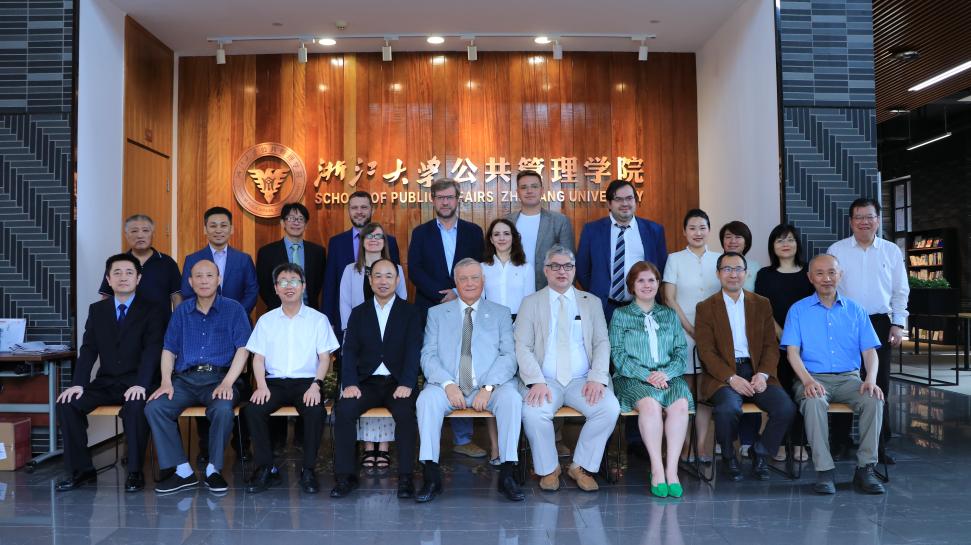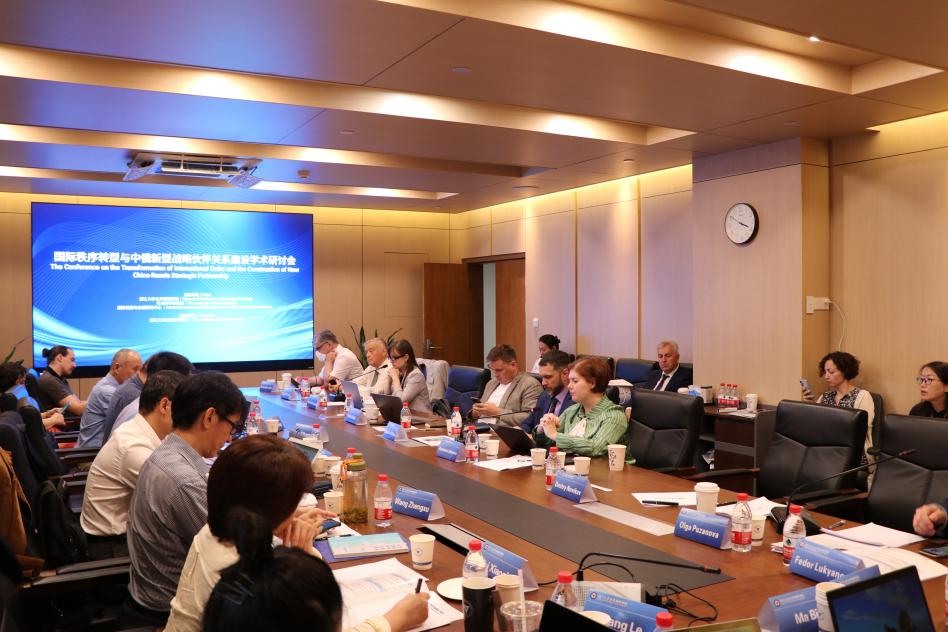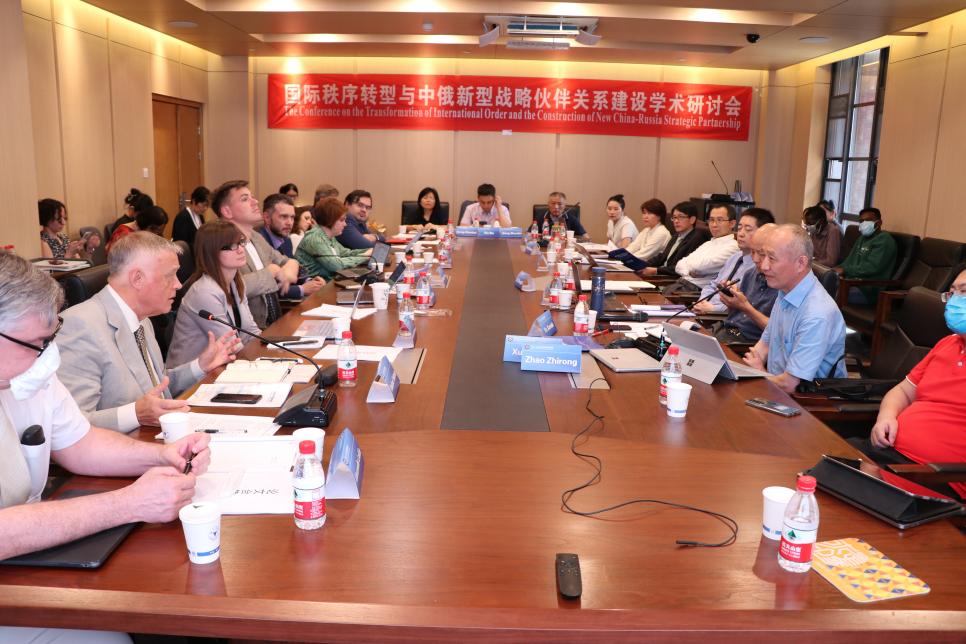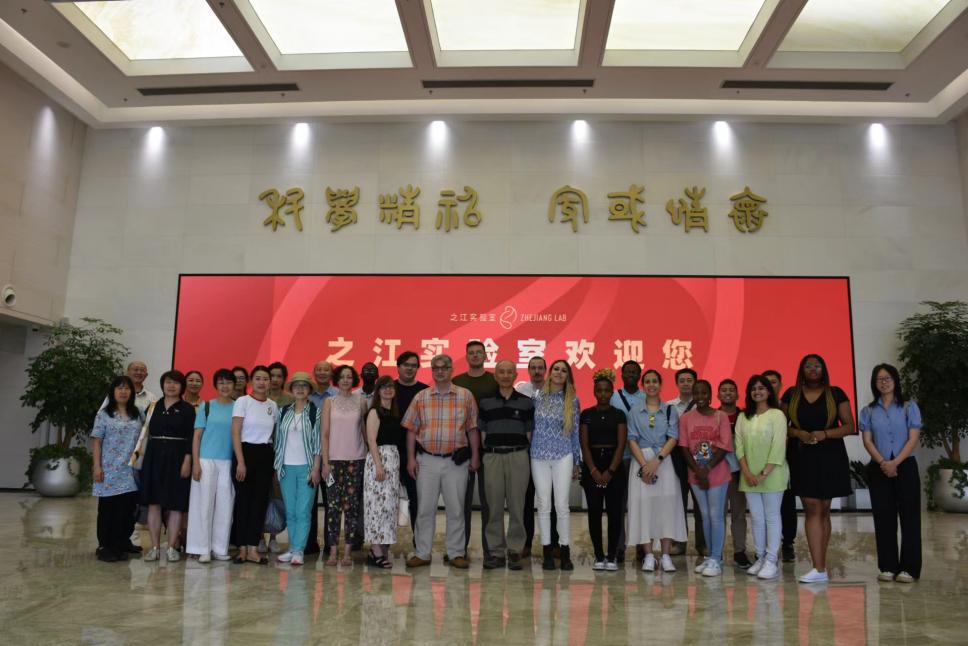On June 21, 2023, the "Academic Seminar on International Order Transformation and Construction: The New Type of Strategic Partnership between China and Russia" was held in Room 301 of the School of Public Affairs at Zhejiang University. This conference was jointly organized by the School of Public Affairs, the Institute of Social Sciences, and the Center for International Development and Governance Research, in collaboration with the Institute of Political Science.
The conference featured the participation of nine distinguished scholars from Higher School of Economics (HSE University) and Moscow State University in Russia. Among them were Vladimir Yakunin, the founder and chairman of the World Public Forum "Dialogue of Civilizations" and former CEO of Russian Railways; Anastasia Likhacheva, Dean of the Faculty of World Economy and International Affairs at HSE University; Alexander Lukin, Director of the Department of International Relations at HSE University; Fedor Lukyanov, Editor-in-Chief of the Russian academic journal "Russia in Global Affairs", Chairman of the Council on Foreign and Defense Policy, and Director of the Academic Council of the International Discussion Club; Dmitry Novikov, Professor at the School of World Economy and International Affairs and Vice Dean of the Faculty of International Relations at HSE University; Maksim Vilisov, Associate Professor at Moscow State University and Secretary-General of the Crisis Society Research Center in Russia; Olga Puzanova, Professor at the Institute of International Relations at HSE University; Anastasiia Piatachkova, Deputy Director of the Center for European and International Studies in the Asia-Pacific Region at HSE University and Head of the International Relations Program; and Andrei Skriba, the director of the Political Geography and Contemporary Geopolitics at HSE University.
The conference also saw the participation of more than 30 well-known Chinese scholars in the field of international relations. Some of them included Zhao Zhirong, the Yangtze River Scholar and Dean of the School of Public Affairs; Lan Zhiyong, National Distinguished Professor at the School of Public Policy and Management, Tsinghua University; Xu Changzhi, Vice Secretary-General of the China-Russia Strategic Cooperation Advanced Think Tank at the Chinese Academy of Social Sciences; Liu Jun, Dean of the Institute of International Relations and Regional Development at East China Normal University and Editor-in-Chief of Russian Studies; Wang Lei, Deputy Director of the European Studies Center at East China Normal University; Ma Bin, Associate Researcher at the Center for Russian and Central Asian Studies at Fudan University. This seminar also witnessed the participation of several scholars from our Zhejiang University, including Zhang Weiwen, Vice Dean of the School of Public Affairs; Xu Baomin, Vice Dean of the Academy of Humanities and Social Sciences; Wang Shizong, Director of the Department of Government; Lang Youxing, Director of the Department of Political Science; Wang Zhengxu, Professor the Department of Political Science; Shi Xiaoqin, Senior Researcher at the School of Public Affairs; Zhou Lu, Professor at the School of International Studies; Jiang Zhenfei, Associate Professor at the School of History; Xue Ranran, Associate Professor at the School of International Studies; Kong Xiaohui, Associate Professor at the School of Public Affairs; Yu Xunda, Professor at the School of Public Affairs. Additionally, there were more than ten international students from SPA-ZJU in attendance at the conference.

The opening ceremony of the conference was hosted by Prof. Yu Xunda. Prof. Zhao Zhirong delivered the welcoming speech. He expressed his warm welcome to all the scholars from home and abroad, emphasizing the importance of academic workshops in fostering discussions, collaborations, and academic exchange between China and Russia. Prof. Xu Baomin and Prof. Alexander Lukin also delivered opening speeches during the ceremony.
This seminar was divided into four sections: "The Multipolar World Order and its Structural Transformation", "Russia's Strategy of 'Turning to the East' and its Prospects", "Peace and Development in a Divided World" and "Exploring the Path to Enhance the New Strategic Partnership between China and Russia".

When discussing the theme of "The Multipolar World Order and its Structural Transformation", several experts shared their insights. Prof. Dmitry Novikov commented on the United States' Asian strategy, and Prof. Vladmir Yakunin explained the public policy agenda in a turbulent world. Prof. Shi Xiaoqin highlighted the formation of AUKUS as a signal of Western maritime alliance construction, and Prof. Ma Bin discussed the adjustment of U.S. Central Asia policy and its impact on China's Belt and Road Initiative. Prof. Jiang Zhenfei summarized the characteristics, laws, and paths to prevent nuclear threats after the Cold War.
In the discussion on "Russia's 'Turn to the East' Strategy and its Prospects", Prof. Fedor Lukyanov explained Russia's challenge of breaking away from Western centrism and establishing new relationships with non-Western countries. Prof. Olga Puzanova focused on Japan, exploring Japan's strategy in East Asia and its relationship with Russia. Prof. Wang Zhengxu analyzed Xi Jinping's leadership style, emphasizing the balance between institutional functions and proactive actions in pursuing political and governance goals. Prof. Yu Xunda believed that the China-Russia relationship has surpassed traditional alliance relations, offering suggestions for further developing under Russia's "Turn to the East" strategy.
In the discussion on "Peace and Development in a Divided World", Prof. Alexander Lukin proposed that the divided East Asia brought China and Russia closer together. Prof. Anastasiia Piatachkova introduced Russia's relationship with ASEAN and the influence of China's factors on it. Prof. Lan Zhiyong argued that facing new challenges in a divided world, China and Russia should cooperate to create a new future. Prof. Zhou Lu introduced tourism cooperation between China and Russia under the Belt and Road framework. Prof. Kong Xiaohui analyzed the impact of the Ukrainian crisis on the Taiwan issue.
When discussing how China and Russia can build a new type of strategic partnership, Prof. Anastasia Likhacheva proposed a new agenda for Russia-China relations from the perspective of "distrustful globalization". Prof. Andrei Skriba analyzed the implementation of decolonization and Russia's "Turn to the East" strategy in the field of international relations education. Prof. Xu Changzhi explored the recent development of China-Russia relations, analyzed the reasons for the lack of trust, Russia's concerns about excessive dependence on China, and the incomplete streamlining of economic relations, and then he provided suggestions for problem-solving. Prof. Wang Lei and Prof. Liu Jun jointly analyzed the historical logic, endogenous dynamics, and independent value of China-Russia relations in the new era. Prof. Xue Ranran presented empirical data to introduce the understanding of Russia as a "warlike nation" in Chinese media, the usage of this term, and its cultural connotations.

During the free speech session at the conference, experts and scholars discussed various topics of mutual concern. They explored the meaning of Russia's "turn to the East" concept, its cultural implications, and how it is perceived by the Russian people. The nature of the Russian-Ukrainian conflict was also explored, along with the views of ordinary Russians on the conflict and its impact on national development.
Overall, the experts and scholars at the conference were in agreement that the world is currently undergoing a significant transition from a unipolar to a multipolar order, which presents both risks and opportunities. The prospects for China-Russia relations in this new era are highly promising and hold great significance. Given the complex international situation, the participants acknowledged the formidable challenges that both China and Russia face, including finding a peaceful resolution to the Russian-Ukrainian conflict, establishing a fair and multipolar world that benefits all nations, promoting cooperation between the two countries in their respective modernization efforts, and building a new type of international relations that fosters a shared future for humanity.
The academic discussions at the conference played a vital role in fostering understanding and mutual trust between China and Russia. Establishing a high-level academic exchange platform is crucial for the stable and long-term development of their relations. Therefore, both sides should continue to collaborate in sustaining academic exchanges.
After the conference, scholars from China and Russia visited the contact office of the Yuhang District People's Congress and Zhejiang Lab. The Russian delegation was highly impressed by the extensive use of digital technology at the contact office, which facilitated communication among People's Congress representatives, government officials, and the general public. They were also amazed by the rapid advancements made by the Zhejiang Lab in high-tech fields within just a few years.



